Corsair, a longstanding and esteemed manufacturer in the PC components industry, initially built its reputation on memory-related products. However, nearly two decades ago, Corsair began diversifying its product line. This expansion started cautiously, with a limited number of products, but quickly proved to be highly successful, propelling Corsair into the industry powerhouse it is today.
One of Corsair’s most triumphant product categories is all-in-one (AIO) liquid coolers. This success is particularly notable given that their initial foray into liquid cooling in 2003 did not meet expectations. However, Corsair didn’t throw in the towel. Undeterred, they re-entered the market years later, leveraging the growing popularity of user-friendly, maintenance-free AIO designs. This gamble paid off handsomely, as AIO coolers are now one of Corsair’s flagship product lines, boasting a wide array of models.
In this review, we focus on the latest addition to Corsair’s AIO cooler lineup: the iCUE LINK TITAN 360 RX. This model is similar to the iCUE LINK H150i RGB, but introduces subtle yet significant improvements, including a performance upgrade with an enhanced pump. The TITAN 360 RX continues Corsair’s tradition of innovation and quality, seamlessly integrating into the iCUE ecosystem for an optimized user experience. Its single-cable design ensures a clean and effortless installation, making it a standout in Corsair’s evolving cooler lineup.
| Corsair iCUE LINK TITAN 360 RGB AIO Cooler Specifications |
|||
| Type | All-in-One Liquid Cooler | ||
| Dimensions | 396 x 120 x 55 mm (radiator with fan) | ||
| Fans | 3 x 120 mm MagLev Fans 300-2100 RPM |
||
| RGB | Yes (ARGB) | ||
| Supported Sockets | Intel: LGA1851 / LGA1700
AMD: AM5 / AM4 |
||
| Warranty | 6 Years | ||
| Price | $200 | ||
Packaging & Bundle
We received the new iCUE LINK TITAN 360 RX in a sizable cardboard package, reflecting the cooler’s substantial size. True to Corsair’s branding, the packaging features their signature black and yellow color scheme. The box prominently displays a vivid image of the iCUE LINK TITAN 360 RX, offering a glimpse of its aesthetic appeal. Upon opening, we found the cooler and its components securely housed within custom-designed cardboard inserts, ensuring they remained well-protected during transit.
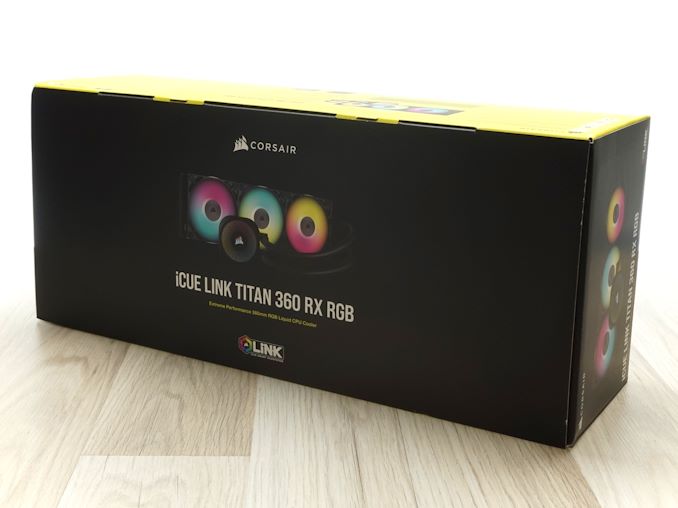
As expected, Corsair includes all the necessary mounting hardware in the box for the iCUE LINK TITAN 360 RX. Separate paper pouches contain the hardware for AMD and Intel processors, making the installation process straightforward. Additionally, the package includes the iCUE Link Hub, a crucial component of the iCUE ecosystem, which is required for the cooler to function.
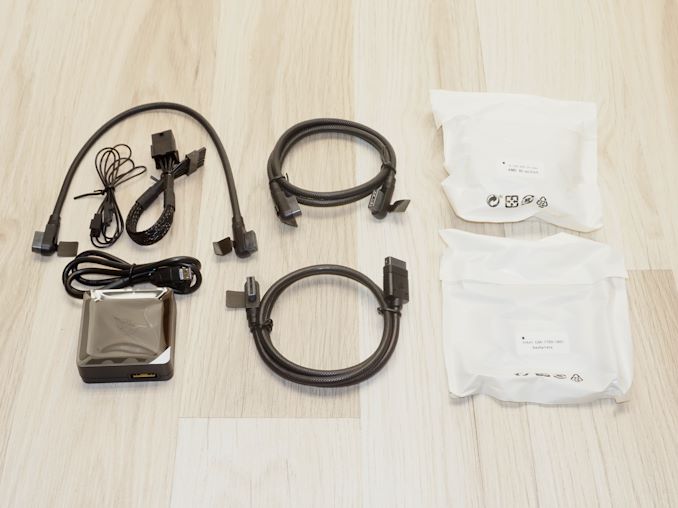
Examining the provided cables, we noticed that the iCUE Link Hub requires a 6-pin PCI Express connector for power. Corsair likely opted for this to save users the hassle of using a Molex cable just to power the hub. Considering that most users purchasing the iCUE LINK TITAN 360 RX likely have a powerful PSU with spare PCI Express connectors—especially with the prevalence of 12VHPWR/12V-6×6 connectors for modern graphics cards—this decision makes sense. However, in scenarios where the user has just enough PCI Express connectors for their graphics cards, they might be forced to upgrade their PSU or use Molex-to-PCIe adapters. Given the hub’s modest power requirements, including an adapter or alternative power option would have been a thoughtful addition.
The Corsair iCUE LINK TITAN 360 RX RGB AIO Liquid Cooler
At first glance, the Corsair iCUE LINK TITAN 360 RX RGB AIO cooler might seem similar to many other 360 mm AIO coolers on the market. However, a closer inspection reveals a unique feature that sets it apart: the complete absence of loose cables, which contributes to a remarkably tidy design. The cooler follows the standard AIO layout with a single radiator, two hoses, and a block that integrates a copper CPU contact plate with a mini liquid pump. Corsair has opted for black sleeved, low-permeation rubber tubing for the iCUE LINK TITAN 360 RX RGB, which is much more flexible than most other similar solutions.
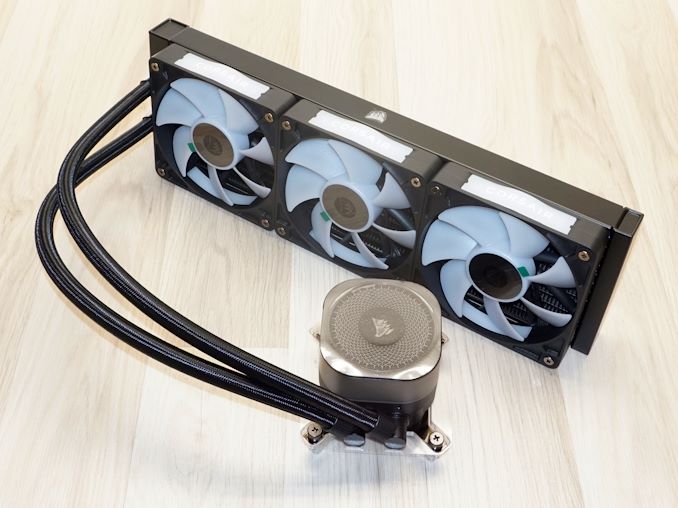
The iCUE LINK TITAN 360 RX RGB features a large radiator, measuring 396 mm in length, which requires a case capable of accommodating three 120 mm fans in a row and providing sufficient space for the radiator’s additional bulk. With a thickness of 27 mm, the radiator demands a total clearance of 55 mm when paired with fans for proper installation. The radiator employs a dual pass cross-flow design with finely soldered fins onto thin oblong tubes, a common feature in AIO coolers. Its low airflow resistance, thanks to the modest thickness, suggests that the radiator is optimized for high performance even with minimal air pressure.
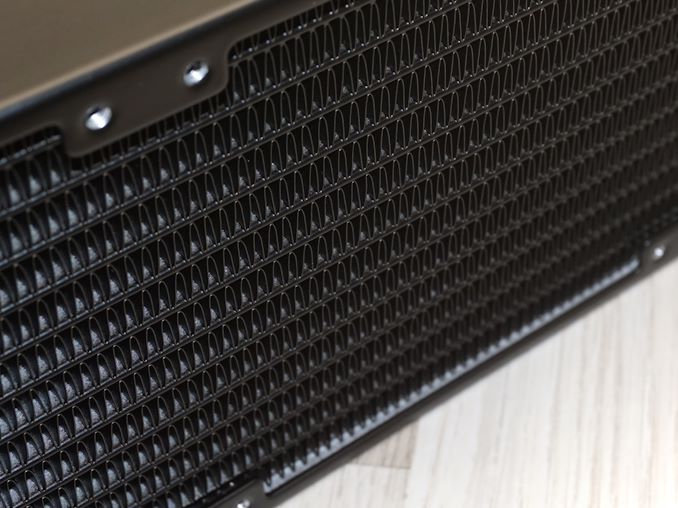
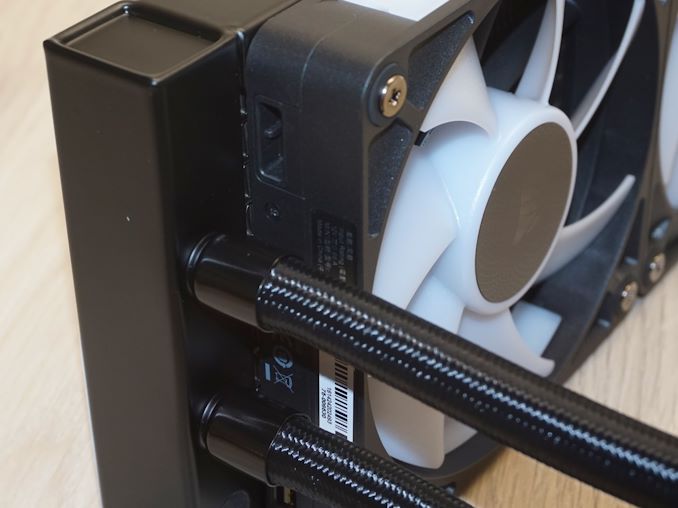
Corsair pre-installs the three RX120 RGB fans on the radiator, and impressively, there is not a single visible wire. These fans are uniquely designed with connectors on the sides of their frames, allowing them to link directly to each other. Just one cable can be used to connect the fans to the hub, providing both power and ARGB/speed control. The fan frames are equipped with LEDs behind diffusers on all sides, including the inside rim, creating a striking lighting effect. Additionally, a small sensor is mounted on one of the fan’s supports. These fans use magnetic levitation motors, a rare but highly reliable and quiet option due to their high cost, and have a broad operational range of 300-2100 RPM. The main difference between this cooler and the iCUE LINK H150i RGB may very well be the fans, as the previous version had QX120 fans installed, which had a maximum rotational speed of 2400 RPM. Also, the decorative plates on the sides of the fans are detachable and can be removed should the user wishes to.
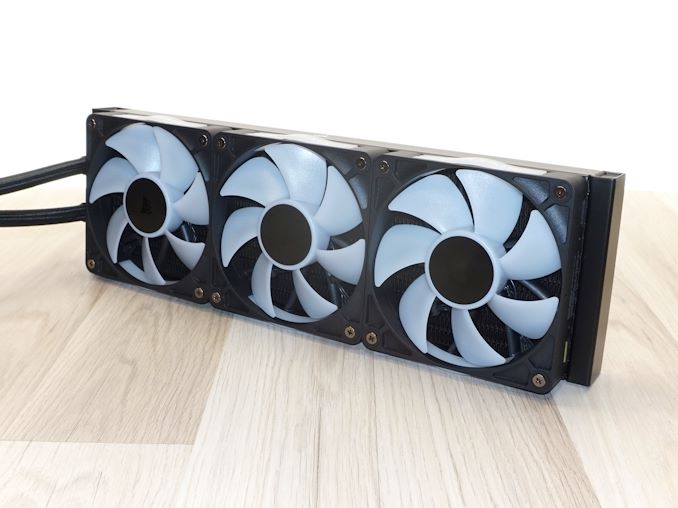
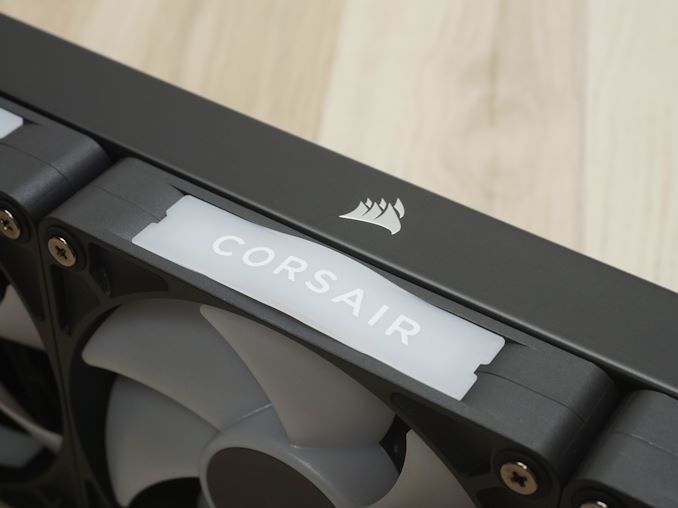
The main block assembly of the iCUE LINK TITAN 360 RX RGB is relatively large and may initially appear simple, but its squircle structure conceals sophisticated design elements. The opaque top half houses multiple LEDs, capable of delivering immersive lighting effects. The top plate is detachable and can be rotated to match the orientation of the cooler in any system, while it also offers users the potential for aesthetic customization, particularly those with access to 3D printers or CNC machines. The block’s design is sleek and free of external connectors or wires.
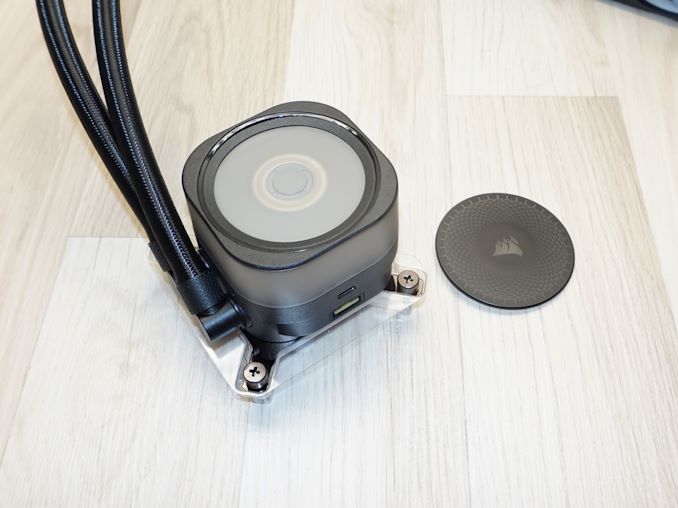
The iCUE LINK TITAN 360 RX RGB cooler comes equipped with a squircle copper contact plate at the base of the block, secured with eight screws. The plate’s surface, while not polished to a mirror finish, is designed so as to ensure optimal thermal energy transfer. Corsair has pre-applied their XTM70 thermal paste to the contact plate, which is supposed to offer superior thermal conductivity, enhancing the cooler’s overall efficiency. The only downside here is that pre-applied paste limits users to just one installation – and it has to be done right the first time – forcing users to purchase some other thermal compound if for any reason the cooler is removed from the CPU.
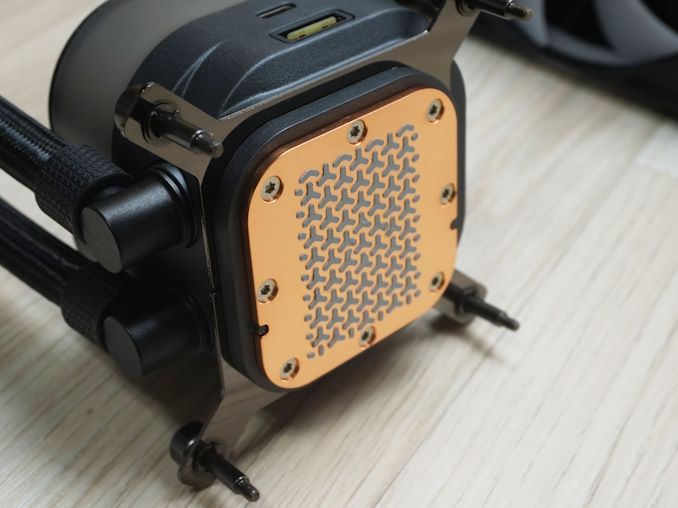
Once everything is connected and powered on, the iCUE LINK TITAN 360 RX RGB transforms into a dazzling light show. LED control is managed through the iCUE LINK interface, with customizable lighting effects available via Corsair’s iCUE software. With the advanced capabilities of the iCUE software, users can select from a wide range of programming options, from simple aesthetic effects to practical, function-based lighting, such as temperature-dependent colors and alarms. The iCUE LINK module, working with the iCUE software, enables complete integration across all compatible Corsair devices, allowing for innovative inter-device control. For example, users could program the function row of a compatible keyboard to act as a lighting indicator for the cooler’s fan RPM, or synchronize the cooler’s lighting with the active profile on a Corsair mouse.


